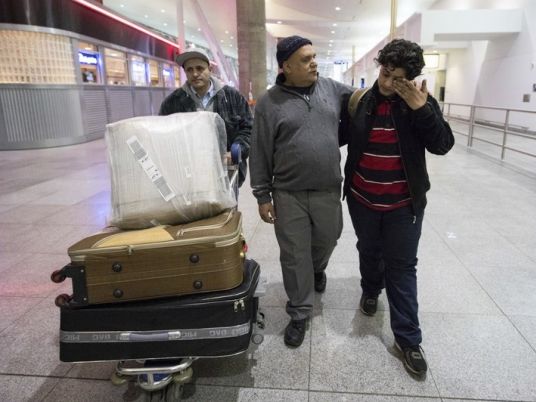
Iraq welcomed its removal from a revised US travel ban on Monday, saying the move would strengthen its alliance with Washington as US-backed Iraqi forces battle the Islamic State group in Mosul.
Iraq was among seven Muslim-majority countries whose nationals were temporarily banned from traveling to the United States in an earlier order issued by President Donald Trump in January, which sparked worldwide outrage and was blocked by the courts.
The White House says the ban is needed to prevent would-be terrorists from entering the country while stricter vetting measures are put in place. But it removed Iraq from the list under pressure from the State Department and the Defense Department, which had noted the close cooperation between the two countries in battling the IS group.
"Today our battle in Mosul is a battle that Iraqis are conducting on behalf of the entire world," Foreign Ministry spokesman Ahmed Jamal told The Associated Press, adding that the revision of the travel ban will "enhance" the US-Iraqi partnership in that fight.
The original order angered many Iraqis, and prompted parliament to call for a reciprocal ban on Americans entering Iraq. Prime Minister Haider al-Abadi declined to impose such a measure.
The revised US travel order is narrower and specifies that a 90-day ban on people from Sudan, Syria, Iran, Libya, Somalia, and Yemen does not apply to those who already have valid visas.
A fact sheet detailing the order cited negotiations that resulted in Iraq agreeing to "increase cooperation with the US government on the vetting of its citizens applying for a visa to travel to the United States."
Thousands of American forces are in Iraq providing air support and logistical help for a massive operation to drive IS militants from Mosul, the country's second largest city. Smaller numbers of US special operations forces are embedded with some Iraqi units.
Support from a US-led coalition has been critical in the fight against IS, helping Iraqi forces to slowly roll back the militants over the past two and a half years. Iraqi forces are now in the midst of their toughest battle yet against IS as they push to retake Mosul's west after the eastern half of the city was declared "full liberated" in January.
Iraqi troops on the front lines welcomed the revision to the travel ban while still expressing anger over the original order.
"To be honest, [the original ban] made me upset and that will not change," said Sgt. Maj. Asad al-Asadi of Iraq's special forces, who has been away from home battling IS for nearly three years. "I've lost three friends fighting terrorists and Trump calls me a terrorist."




